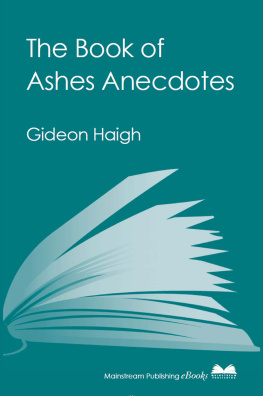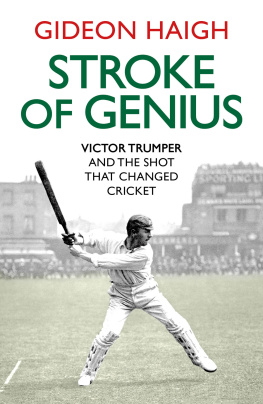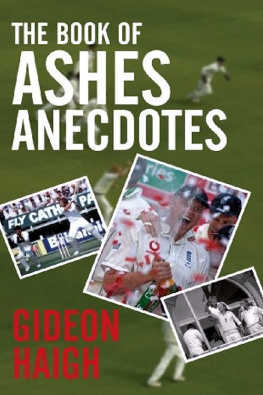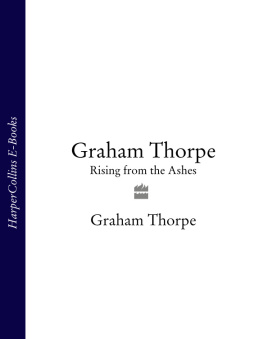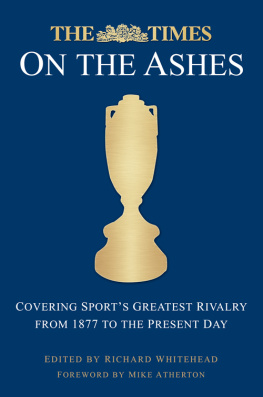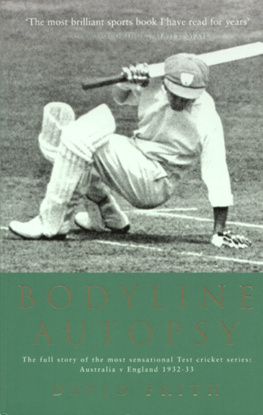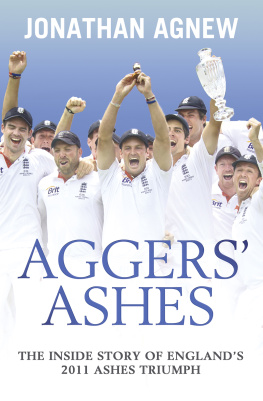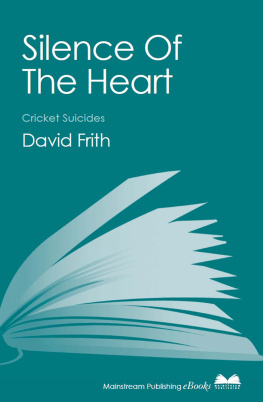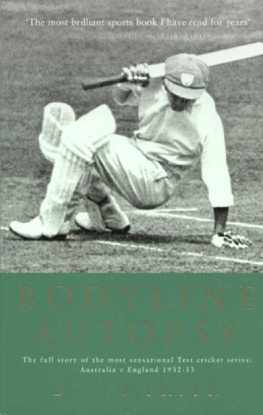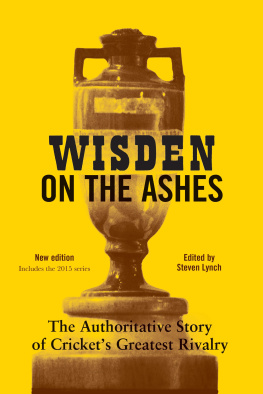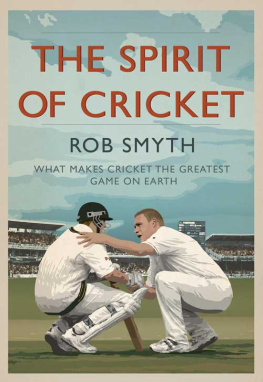CONTENTS
THE BOOK OF ASHES ANECDOTES
Gideon Haigh

This eBook is copyright material and must not be copied, reproduced, transferred, distributed, leased, licenced or publicly performed or used in any way except as specifically permitted in writing by the publishers, as allowed under the terms and conditions under which it was purchased or as strictly permitted by applicable copyright law. Any unauthorised distribution or use of this text may be a direct infringement of the authors and publishers rights and those responsible may be liable in law accordingly.
Epub ISBN: 9781780574394
Version 1.0
www.mainstreampublishing.com
Introduction, selection and commentary copyright Gideon Haigh, 2006; copyright in contributions reserved by individual copyright holders.
Preface and concept copyright Richard Smart, 2006
Foreword copyright David Frith, 2006
All rights reserved
The right of Gideon Haigh, Richard Smart and David Frith to be identified as an author of this work has been asserted by each of them in accordance with the United Kingdom Copyright Designs and Patents Act 1988
First published by Penguin Group (Australia) in 2006
First published in Great Britain in 2006 by
MAINSTREAM PUBLISHING COMPANY (EDINBURGH) LTD
7 Albany Street
Edinburgh EH1 3UG
ISBN 978 1 84596 257 9 (from January 2007)
ISBN 1 84596 257 5
No part of this book may be reproduced or transmitted in any form or by any other means without permission in writing from the publisher, except by a reviewer who wishes to quote brief passages in connection with a review written for insertion in a magazine, newspaper or broadcast
A catalogue record for this book is available from the British Library
INTRODUCTION
England and America were famously described by Oscar Wilde as two nations divided by a common language; England and Australia are two nations divided by a common game. Cricket was imported to Australia more than two centuries ago, but it did not surge in popularity until buoyed by that most deeply embedded of rivalries: between reproving parent and unruly offspring. Almost everything about the relations between the countries has changed since, and the ties now hang loosely indeed. But somehow, cricket hostilities bring forth a flood of feeling, one countrys champagne and schadenfreude being the others beer and brooding.
The Ashes lends itself naturally to the telling of stories. Their inauguration 124 years ago was a jest made real: the mock obituary for English cricket in TheSporting Times by Reginald Shirley Brooks turned into a physical artefact by the society belles in the circle of Lady Clarke at Rupertswood. The contents of this book are, likewise, spontaneous acts given permanent form: events that were first thought worth honouring in the memory, and that now form part of the lore and legend of this most enduring rivalry. To quote the Australian historian Greg Dening, There is nothing so momentary as a sporting achievement and nothing so lasting as the memory of it.
In Test cricket, too, stories have the chance to ferment and mature before bottling. The breadth and depth of the games literature is often chalked up to its steadily unfolding five-day duration, which allows pauses for thought and for documentation. That certainly seems to explain why so few decent yarns concern one-day cricket: everybodys panting too much to deliver the shrewd verdict or the witty riposte. But there may be more to it. The contest is only one dimension of Test cricket: more time is spent in states of anticipation and reflection, which makes for interludes of anxiety and self-control, defiance and resignation, exultation and regret.
Sifted from more than 260 books, newspapers and periodicals, The Book of Ashes Anecdotes attends first to the most exalted players and greatest contests but it also, like the games themselves, involves a little more. The Ashes fosters competition on whose limits there is not universal agreement: thus, a chronicle of gamesmen, beginning with Dr W.G. Grace, who bent the rules, sometimes to breaking point. The Ashes, similarly, transplants young, sometimes nave and impressionable men from one country to another, with all that this entails: thus, a chapter of travellers tales, often demonstrating how small differences can beget big misunderstandings. The Ashes, of course, as any Barmy Army infantryman will tell you, is a theatre in which the audience are very much part of the action: thus, an epidemiological study of that most virulent of contagions, cricket fever. The Ashes, finally, is a world where skill and preparation smack into luck and chance: thus, some stories of the excesses of superstition and the enchantments of selection.
Any cricket history nowadays that emphasises the Ashes courts the displeasure of the games globalists. The rivalry has never wanted for doomsayers and detractors, and there are neophiliacs now who see a five-day Test as fifteen Twenty20 games forgone. Yet cricket without history and sentiment is a sterile spectacle: even the galacticos gathered by the International Cricket Council could not save the 2005 Super Series in Australia from looking like an ugly trophy in search of a purpose.
That is not to say that the history has been a pageant of unleavened triumph. The Ashes have known their doldrums and longueurs in the 1960s because the gravity and ceremony surrounding Test matches seemed to stifle enterprise and imagination, while in the 1990s the decadence of English cricket rendered the contests hopelessly one-sided.
Yet it is amazing how quickly the whiff of a contest stirs the embers in the fire. When England stormed back from a 01 deficit to recapture the trophy in 2005, sixteen years since their dispossession, the scenes at The Oval could have been from 1953, or 1926, or even 1882 likewise the sense of euphoric unreality among one countrys supporters and chagrined disbelief among the others. One priceless scene unfolded as bad light and rain threatened to interrupt play on the penultimate day, at a time when Australia was pressing for victory and England seeking the sanctuary of a draw the formers fans could be seen removing their shirts and donning sunglasses, while the latters faithful brandished umbrellas and cheered evidence of the use of light meters. Laughter rich and rueful echoed round the ground. The sense was of two countries not merely divided by a common game but united by an ardent rivalry. Long may it continue.
1 GIANTS OF THE GAME
Great cricketers attract stories as great ships attract barnacles. This chapter collects 260 stories encrusting eighty-five outstanding reputations from England and Australia, from Grace to Gilchrist, showing them in action and repose, triumph and adversity. Sir Donald Bradman is chief among them, for everyone who so much as stood next to him at a bus stop has a Bradman story: just as his run-making prowess occasions awe, his moments of fallibility affirm his common humanity. But there are plenty more. Nowadays, the stat enjoys primacy in any reckoning of a players career. But often a story will do just as well, if not better, in conveying the esteem or otherwise that he enjoyed among contemporary players and public. If it didnt, in fact, cricket would not be the game it is.
DR W.G. GRACE
The best cricketer of all, thought his chief Australian rival, Billy Murdoch...
What do I think of W.G.? Why, that I have never seen his like and never shall. I tell you my opinion, which is that W.G. should never be put underground. When he dies his body ought to be embalmed and permanently exhibited in the British Museum as the colossal cricketer of all time.
Next page
